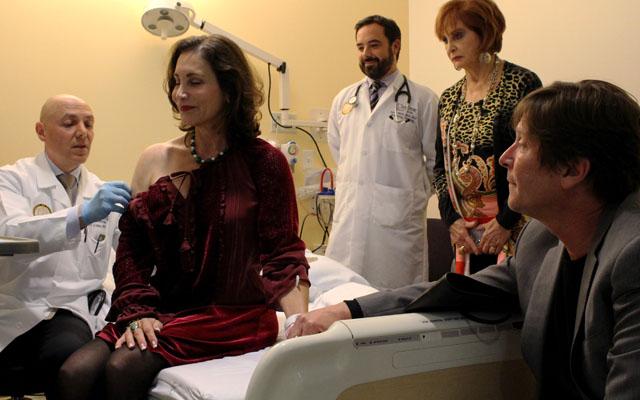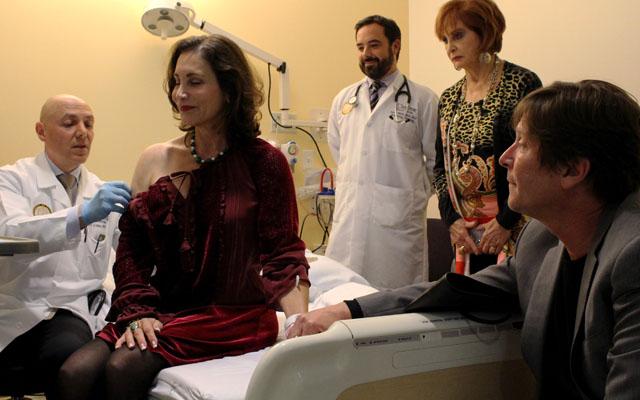
Credit: UC San Diego Health
Tamara Strauss has been living with high-grade, stage IV pancreatic neuroendocrine cancer for more than three years. Current treatments, although effective for her, are highly toxic. Tamara enrolled in a first-of-its-kind, pilot study at Moores Cancer Center at UC San Diego Health to test a personalized vaccine using her unique cancer mutations to boost an anti-tumor immune response.
Led by Stephen Schoenberger, PhD, professor of immunology at the La Jolla Institute for Allergy and Immunology (LJI), and Ezra Cohen, MD, professor of medicine at University of California San Diego School of Medicine, scientists and clinicians have developed a technology that reliably defines the neoantigens — foreign protein fragments recognized by the immune system — in a patient's cancer.
With neoantigens identified, the team can identify peptides — strings of amino acids — that can be used to create a vaccine to stimulate a protective immune system response. Essentially, the information in a patient's cancer is used to boost the immune system to initiate a stronger response from both cytotoxic and "helper" T cells — white blood cells that collaborate to destroy cancer cells.
"T cells need to recognize a cancer cell as being different before they can produce a response to destroy a patient's tumor," said Cohen, associate director for translational science at Moores Cancer Center and an internationally recognized physician-scientist who specializes in novel cancer therapies. "It's a complicated process to harness this power into a vaccine. We are creating an incredibly personalized and precise therapy that is based on what that person's cancer and immune system are telling us. Each vaccine we develop only applies to a specific individual."
Tamara was selected as the first patient for the trial because, despite disease progression, her body remains strong, and is more likely to respond positively to the experimental immunotherapy treatment.
Tamara's parents, Iris and Matthew Strauss, donated $1 million to help launch the clinical trial, hoping that a breakthrough treatment could help patients like their daughter beat their disease. The family has already lost one daughter to ovarian cancer.
After sequencing Tamara's tumor and normal tissue, the team identified mutations expressed solely by cancer cells in her body. Schoenberger and LJI's Bjoern Peters, PhD, developed a novel algorithm to select mutations that are recognized by the immune system. This algorithm was deployed to recognize the neoantigens that generated the strongest T cell response from Tamara's tissue samples. These neoantigens were then presented to Tamara's own T cells and cultured over a two-week period using 50 milliliters of her blood to develop a personalized vaccine.
"It's been invention and new science every step of the way. This process simply hasn't existed until we tried to build it here," said Schoenberger. "By opening up our eyes and measuring what's really happening with the cancer cells and the immune system, rather than predicting what we hope is there, we could make the transformational step needed to make this approach possible."
Tamara's vaccine took eight weeks to produce. When it was ready, Cohen took the vaccine filled syringe and administered it in Tamara's upper arm, like a simple flu vaccine. After receiving the injection, Tamara said the liquid felt thick and warm, stinging just a bit more than a typical vaccine.
The vaccine is part of a one-two punch. In addition to the vaccine, patients receive pembrolizumab (Keytruda), a FDA-approved immune checkpoint blockade inhibitor that blocks abnormal interaction between the molecule PD-1 on immune cells and the molecule PD-L1 on cancer cells, allowing the immune cells to recognize and attack tumors. Combined with the vaccine, the drug should unleash the full potential of T cells activated by the vaccine, said Schoenberger.
During the trial, participants will return for two additional vaccine doses and remain on pembrolizumab for up to two years. Their health will be monitored for a minimum of five years.
"As much I would love to be cancer-free more than anything, I hope this vaccine truly does work because of the immense impact it could make on helping so many people, and easing the pain of what they go through as a cancer patient, would be phenomenal," said Tamara.
The trial will enroll 10 participants with solid tumors whose disease has not responded to or has stopped responding to standard therapies. Cancer cells can adapt to treatment and become resistant, but inherent in the immune system is a way to prevent resistance, said Cohen. The idea is that the vaccine and check-point inhibitor will stimulate the immune response and that the vaccine will help the immune system to adapt with the cancer to prevent resistance from occurring.
"The first and foremost thing that I want is clinical benefit for these patients. I want their tumors to either stop growing or start shrinking," said Schoenberger. "Scientifically, I want to be able to measure that the targets we're identifying are relevant, that we see an increase in the number of T cells or in their functional capacity. That will let us know we're really on to something. And then, I'm hoping that we can find the resources needed to treat more patients so we can be certain that this approach truly works."
In addition to the philanthropic gift from the Strauss family, initial giving from the Immunotherapy Foundation created the infrastructure for the trial and funds raised by patient-advocates, Kristin and Wyatt Peabody helped launch the trial.
"Funding science that is this new, this innovative is challenging, but they recognize that this may be a paradigm shift for the way we treat cancer and the way we view cancer in the future," said Cohen. "If we're going to take the next big step toward curing cancer, we realized we have to do it on an individualized and personalized approach because that's what cancer is. Every person's cancer is different. We need to stop taking patients and try to fit them to drugs. We need to start making drugs and fitting them to what we're seeing biologically in a patient's cancer."
###
For more information about the clinical trial visit clinicaltrials.ucsd.edu/trial/NCT03568058
Media Contact
Yadira Galindo
[email protected]
858-249-0456
@UCSanDiego
http://www.ucsd.edu





